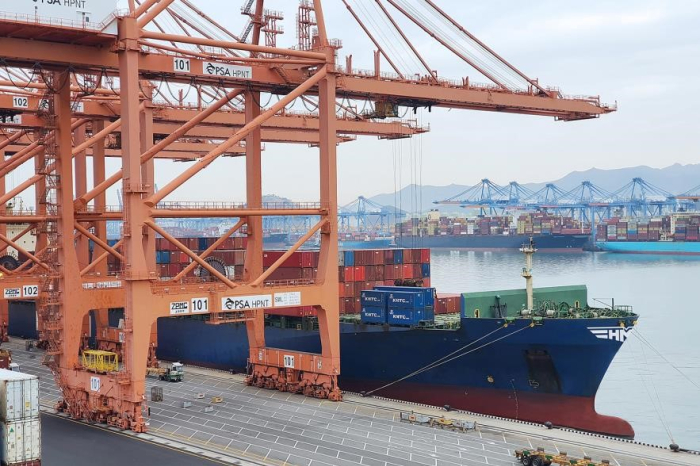Since the end of last year, countries have begun lifting COVID-19 lockdowns, driving a speedy recovery in export freight volume despite transportation shortages, bringing on a freight crunch.
South Korean export firms are facing an unprecedented crisis as they are unable to ship products due to container shortages. The sailing schedule for containers has been delayed due to strict quarantine measures. Also, loading and unloading activity at ports in Europe and the US has fallen behind due to employee shortages.
This month alone, domestic logistics firm Pantos Logistics Co. has been receiving thousands of calls daily from shippers offering to pay extra to secure container space to ship their goods. Large companies such as Samsung Electronics Co. and LG Electronics Inc. are no exception.
According to the Korea Ocean Business Corporation, global freight demand this year has climbed 6.9% to around 21.4 million twenty-foot equivalent units (TEUs), whereas container capacity has increased by just 3.4% compared to the previous year.
Domestic export firms are experiencing a double whammy as they have to pay for storage while they wait for container space, alongside surging freight rates caused by container shortages.
"Logistics centers located near ports are all completely packed," said a trade industry official.
Another factor behind Korea's freight chaos is that foreign shipping companies are opting to skip Korea on their routes. Domestic export firms usually ship their products on foreign containers that depart from China and stop in Korea before heading to the US and Europe.
But recently, most of the foreign containers departing from China are already fully loaded, making it unnecessary to stop by Korea. Also, ships prefer loading goods from China because the distance is longer and more profitable.
HIGH FREIGHT RATES THE NEW NORM?This freight crisis has a graver impact on small and medium-sized companies. In general, large companies usually secure container space through a freight forwarder by inking six-month or one-year contracts with shipping companies, while most SMEs opt for spot contracts.
Each container offers around 60 to 70% of container space for long-term contracts while allocating the remaining space for spots. The faster-than-expected economic recovery has fueled competition among SMEs vying to secure spots even if they have to pay extra fees.
There is also an increasing number of cases in which shipping companies terminate long-term contracts with large companies and instead sign spot contracts as these are more profitable due to the spike in prices.
Even large businesses that have already signed long-term contracts need spot freight space. Recently, the polypropylene (PP) price has soared in the US because of a supply shortage caused by winter storms that shut down plants in Texas. Polypropylene is a raw material used to make syringes that contain COVID-19 vaccines.
Seeing this as an opportunity, some domestic chemical firms, such as Lotte Chemical Corp. and Hyosung Chemical Corp., have been trying to export polypropylene to the US, but their efforts have been unsuccessful because they couldn't secure spot contracts.
Meanwhile, global shipping firms have been placing new orders for containers to handle the rising freight volume. Yet, the dominating view is that it’ll be difficult to resolve the freight chaos anytime soon -- with some industry watchers even saying that the expensive freight rates may become the new norm.
The South Korean government has been operating a logistics response center since last December to accommodate the freight crunch, but there isn't much that can be done as the government can't interfere with freight rates that are determined by the market.
Instead, the Ministry of SMEs and Startups plans to provide up to 2 million won in subsidies for increased freight rates for domestic SMEs that apply.
Write to Kyung-min Kang and Hyung-kyu Kim at
kkm1026@hankyung.comDanbee Lee edited this article.






